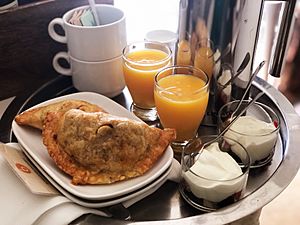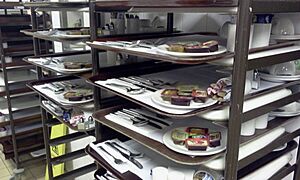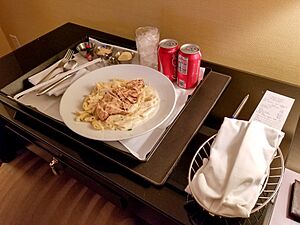Room service facts for kids
Room service is a special service offered by hotels. It lets guests order food and drinks directly to their hotel room. You might also hear it called in-room dining.
This service is usually found in fancy hotels and resorts. It's not common in smaller, less expensive hotels or motels. You can also find room service on large cruise ships. Some hotels offer it all day and night, while others only have it during certain hours. Because it's a special delivery, the food and drinks often cost more than if you ate in the hotel's restaurant. A gratuity (or tip) is also usually expected for the staff who bring the food.
How Room Service Started
The Waldorf Astoria hotel in New York City is famous for being one of the first modern hotels to offer room service. This hotel was built in the late 1800s and was a symbol of luxury.
The original Waldorf Astoria was on 5th Avenue. It was rebuilt and reopened in 1931 on Park Avenue. This new hotel was a pioneer in many ways. Besides introducing room service, it was also one of the first to offer restaurant reservations. It also had full electrical wiring and a telephone in every room! The hotel was designed for wealthy people and important visitors from other countries.
Today, room service is a must-have for any high-end hotel around the world. Some hotels even offer unique room service experiences. For example, you might get live music with your appetizers in Nashville. Or, you could have s'mores and champagne delivered in Napa Valley. Some places even bring vinyl records right to your room!
In 2013, the Mater Private Hospital in Brisbane, Australia, became the first hospital to offer room service. They did this to help patients get the right nutrition. This made sure patients got better food at a good price. As technology grows, hotels keep finding new ways to make room service even better for everyone.
How Room Service Works
Hotels usually have their own rules for room service. There isn't one single way that all places do it. But generally, room service means you can order a meal. Then, the meal is made and brought to your room. This helps make sure guests are as comfortable as possible.
Who Works in Room Service?
Many different hotel staff members help make room service happen.
Hotel Management
Hotel managers make sure guests are happy with room service. They handle any complaints or questions. They also hire and train staff. Managers also manage the budget and plan events.
Restaurant Manager
Restaurant managers make sure room service orders are correct and delivered quickly. They also ensure that all health and safety rules are followed. They help hire and train staff, plan menus, and handle customer issues.
Waiter or Waitress
Waiters and waitresses (also called "servers") set up the hotel restaurant. They also deliver food to rooms. They make sure guests have everything they need. They often greet guests and explain the menu. They also prepare tables and communicate with the kitchen staff.
Executive Chef
The executive chef, or head chef, runs the kitchen. They make sure all the food served is top quality. They create menus and invent new dishes. They also supervise the kitchen staff. Their job is mostly about organizing and checking things. They make sure the kitchen is clean and safe. They also hire and train cooks and keep track of food supplies.
Kitchen Staff
The kitchen staff prepares the food. They follow the hotel's standards and procedures. They help the chefs cook. They also check the quality of ingredients. They place orders with suppliers and schedule food deliveries. Kitchen staff have many jobs in a busy kitchen. They help prepare ingredients by washing, cutting, and peeling. They also store ingredients properly. They clean and sanitize equipment, dishes, and work areas to keep everything healthy and safe.
Food Runner
Food runners are like a link between the kitchen and the guest. Their main job is to deliver food to the correct room as fast as possible. They also help staff with order priorities. They can answer customer questions that come up. Food runners also greet guests, explain menus, and inspect the food before it goes out. They also help clear and clean tables.
Hotel Security
Hotel security staff watch over the hotel's security system. This includes the restaurant and public areas. They set up emergency plans. They also work to prevent problems like food poisoning.
Good and Bad Things About Room Service
Good Things
- You can eat and drink in your own private room.
- You can order meals whenever you want.
- It can help reduce food waste.
- It's very convenient for guests with children or babies.
- It helps keep guests safe because they can stay inside the hotel.
Bad Things
- Food and drinks are usually more expensive.
- Hot food can get cold before it reaches your room.
- You might not get to try local foods outside the hotel.
- You can't see your food being prepared.
- Room service menus are often small. This is so cooks on different shifts can make all the items.
Room Service in Hospitals
Some hospitals now offer room service for patients. Patients can order the food they want from a menu. They can also choose a time that works for them. Hospital staff might help patients to make sure they follow their special diets. Visitors can also order from room service for a fee.
Benefits of Hospital Room Service
- Patients are happier with their meals.
- Fewer extra meal trays and unwanted food plates.
- Meals are more accurate to what was ordered.
- Hospitals can earn more money by serving family and visitors.
- Food service workers can talk more with patients, which makes them happier.
- Food is fresher, better quality, and served at the right temperature.
- Hospitals can help people who don't have enough food.
 | Misty Copeland |
 | Raven Wilkinson |
 | Debra Austin |
 | Aesha Ash |




